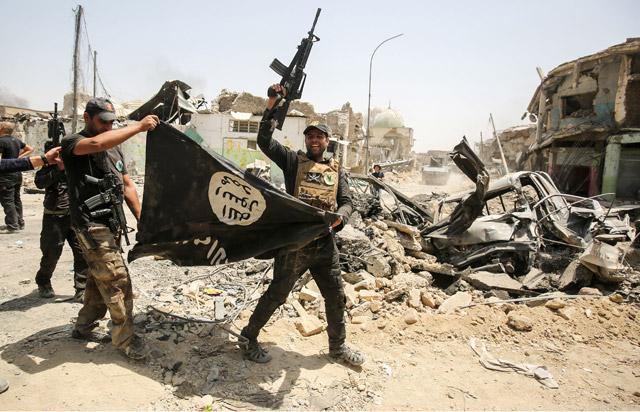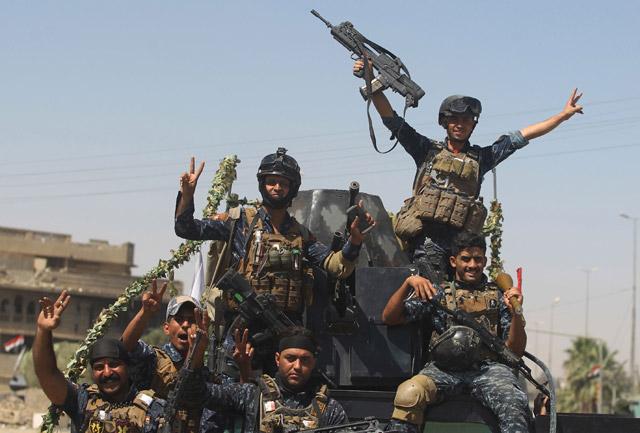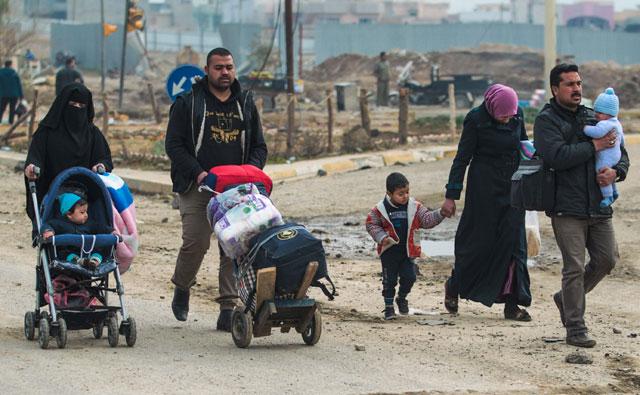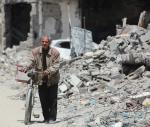You are here
King congratulates Iraq’s Abadi over victories
By JT - Jul 02,2017 - Last updated at Jul 02,2017

Members of the Iraqi Counter-Terrorism Service cheer as they carry upside-down a black flag of the Daesh group, with the destroyed Al Nuri Mosque seen in the background, in the Old City of Mosul on Sunday, during the offensive to retake the city from Daesh fighters (AFP photo)
AMMAN — His Majesty King Abdullah on Sunday congratulated Iraqi Prime Minister Haider Al Abadi over the victories of the Iraqi army against Daesh in Mosul, a Royal Court statement said.
During a phone call, the King stressed the importance of boosting cooperation between Jordan and Iraq and intensifying the regional and international efforts in the fight against terror within a holistic strategy.
Meanwhile, Agence France-Presse reported Sunday that Iraqi forces were battling the last few hundred extremists in Mosul’s historic centre as they pressed the final stages of an assault to drive the Daesh terror group from the city.
More than eight months since the country’s forces launched a gruelling operation to retake Mosul, Daesh has gone from fully controlling the city to holding a few neighbourhoods on its western side.
“The number is... more or less 300 fighters, most of them of European nationalities, Arabs of other nationalities or of Asian origin,” said Staff Brigadier General Nabil Al Fatlawi, a commander in the elite Counter-Terrorism Service (CTS).
“We are not able to specify when the battles will end because of the narrow type of streets in the Old City and also the presence of civilian detainees,” Fatlawi said, referring to residents being used as human shields by Daesh.
“But I can say within days,” he said.
Earlier in the day, Iraq’s Joint Operations Command announced CTS forces had recaptured the Makawi area of the Old City, in a further blow at the heart of the extremists’ cross-border “caliphate”.
Iraqi forces have been closing in on the Old City for months, but its narrow streets and closely spaced buildings combined with a large civilian population made for an extremely difficult fight.
Security forces recaptured a series of nearby districts, cornering the extremists, and launched an assault inside the Old City on June 18.
They have since made significant progress.
On Saturday, officers announced the recapture of a hospital and its surroundings north of the Old City, removing a nearby but unconnected pocket of Daesh resistance.
Interior ministry forces recaptured the Ibn Sina Hospital along with other medical facilities including a Daesh bank and a clinic, said Staff Lieutenant General Abdulamir Yarallah.
Daesh has occupied several of Mosul›s hospitals during the battle for the city.
Some security personnel have complained that restrictions on using heavy weapons against hospitals, intended to protect the facilities, have made operations riskier and more time consuming.
Federal police chief Lieutenant General Raed Shakir Jawdat said the area around the hospital, Al Shifaa, had been completely retaken, limiting Daesh’s presence in Mosul to the Old City.
“Our forces are advancing from three sides and are pursuing the terrorist groups in the few remaining areas of the Old City,” said Jawdat.
On Thursday, Iraqi forces retook the remains of the Grand Mosque of Al Nuri in their greatest symbolic victory since the battle began.
Daesh chief Abu Bakr Al Baghdadi gave a triumphal sermon at the mosque after the extremists captured Mosul in 2014, calling on Muslims to obey him.
The mosque thus became a symbol of Baghdadi’s rule and Daesh’s self-styled “caliphate”.
The extremists made sure that the Nuri Mosque was not captured intact, blowing it up as Iraqi forces closed in, along with its famed leaning minaret — known affectionately as “Al Hadba” (The Hunchback).
Daesh claimed on its Amaq propaganda agency that the site was hit in a US air strike, but the US-led coalition said it was the extremists who had “destroyed one of Mosul and Iraq›s great treasures”.
Even though it lies in ruins, the mosque’s recapture has provided a boost to Iraq’s forces and its government. Prime Minister Haider Al Abadi declared the extremists’ “caliphate” was coming to an end.
The next day, a senior Iraqi commander said victory in Mosul would be declared within the “next few days”.
Daesh overran large areas north and west of Baghdad in 2014, but Iraqi forces backed by US-led coalition air strikes have since regained much of the territory they lost.
The recapture of Mosul will not, however, mark the end of the war against Daesh.
The extremist group still holds territories in both Iraq and neighbouring Syria, where it has been able to carry out attacks in government-held areas.
The extremist group has also inspired “lone wolf” attacks overseas.
Related Articles
MOSUL, Iraq — Iraqi soldiers snap victorious “selfies” and pose with a captured Daesh terror group flag at the Mosul mosque where extremist
MOSUL, Iraq — Iraq declared the Daesh terror group’s “caliphate” was coming to an end after it recaptured Mosul’s iconic Nuri Mosque Thursda
MOSUL — Iraqi forces on Sunday retook two areas from the Daesh terror group in Mosul, sealing their control of the east bank three months in

















